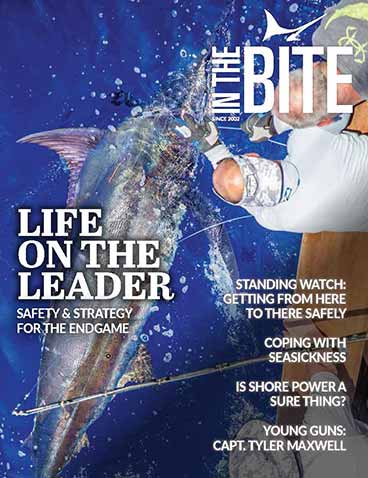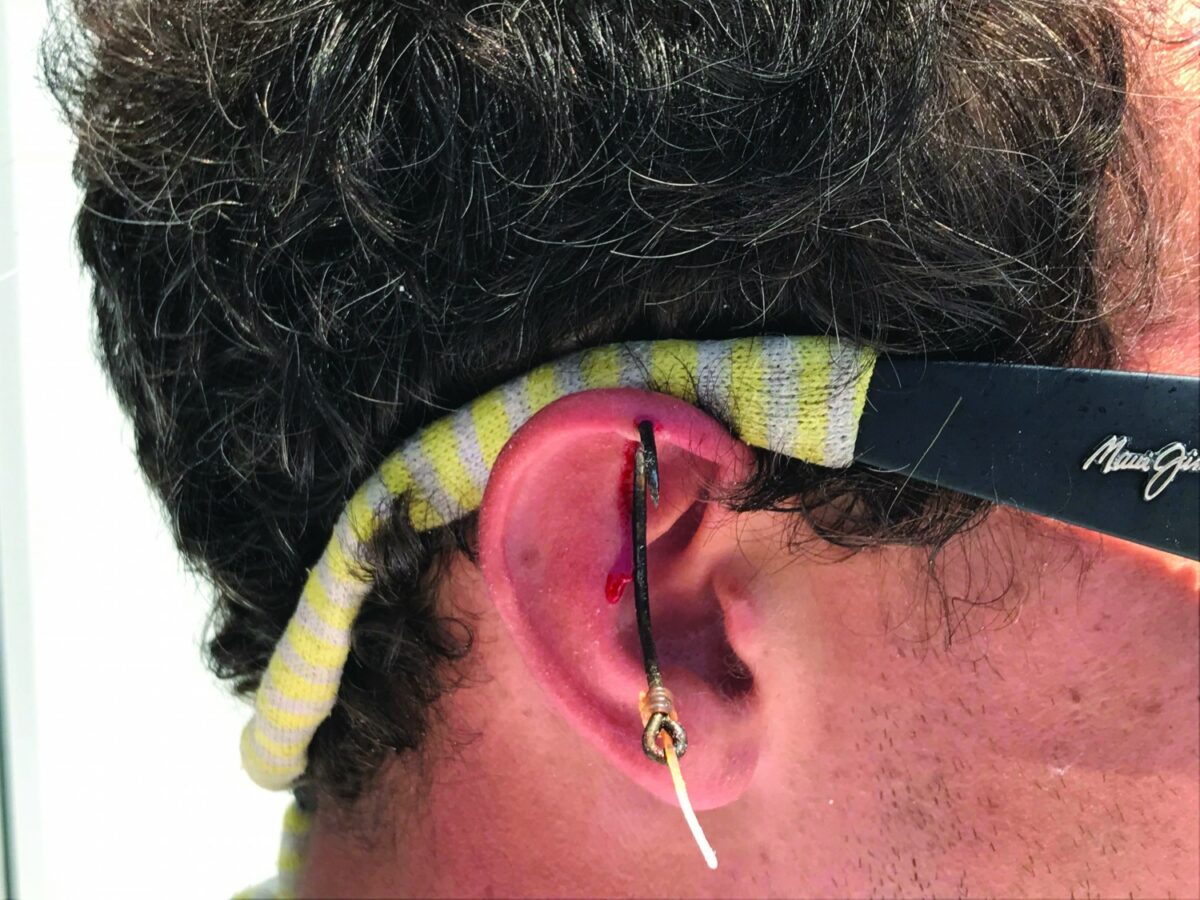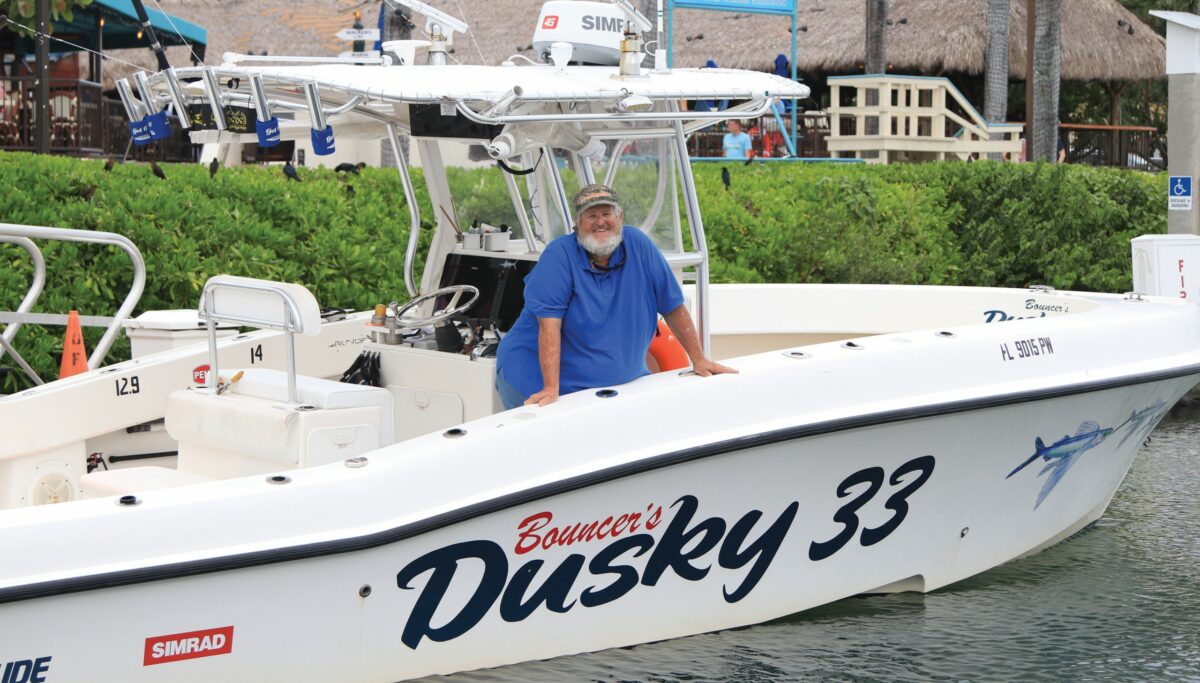Just when the sun started to glow in the eastern sky, I decided to go to sleep. After manning the swordfish baits all night, I was exhausted. As I cleared the rigged squid and crawled into my bunk, the dawn patrol crew set out the trolling spread. I had just dozed off when a commotion on the deck brought me straight out of my bunk. I rushed into the cockpit to find three 80s screaming, men running in every direction and someone barking orders: Grab that rod! I obeyed and soon was strapped into a monster big-eye tuna. So much for sleep. Captains and crews in the know already understand the advantages of night fishing. Not only does it add hours to your trip but it adds species to the menu. And with the price of fuel always on the rise, staying through the night saves time and money too. But the best part of pulling an overnighter is taking advantage of those golden hours of darkness and twilight. Best of all, many times youll have the ocean all to yourself. But fishing far from shore in a small boat in the dead of night takes planning, preparation and precaution. We asked three veterans of the dark side to share their tips and tricks for an efficient and effective night at sea.
Fishing by Feel
Fishing overnight is completely different than on the day shift. Captain Kenny Koci in Hatteras, North Carolina recommends pulling baits through sundown and into the dark. Not only is twilight one of the most productive times of day, he says, but tuna, wahoo and marlin will bite after dark, too. When the water turns inky, Koci deploys a spreader bar in the middle of his spread. Well put glow sticks in the Moldcraft squid bodies, he says. Not only does it bring in the fish but it also helps us see the baits.
At some point, most crews turn to drifting through the night, which is more efficient in terms of saving fuel and also more effective for species like tuna and swordfish. Plus, there less chance of a catastrophic collision while drifting. Captain Bouncer Smith has spent many nights off Miami, Florida aboard his 30-foot Dusky. We only set out three lines, he says. Two are on floats and one is under the boat deep. Smith sets his farthest line 300 feet out without any weight. His next line is 200 feet down with 16 to 24 ounces of lead. The third line is 75 to 150 feet straight under the boat with up to two pounds of lead. The sinkers are attached with light rubber bands so they break away when a fish hits the bait.
Take your time putting out the baits, Captain Koci stresses. Be sure to let each line drift out and set up before putting out the next bait. Failure to do so might result in a mess that goes undetected for hours. At the north end of the coast, Capt. Jack Sprengle fishes off Rhode Island aboard his 40-foot Donzi center console. He also drifts three baits after dark but he keeps his anglers busy working vertical jigs at the same time. If youre not jigging after dark, youre wasting an opportunity, he says.
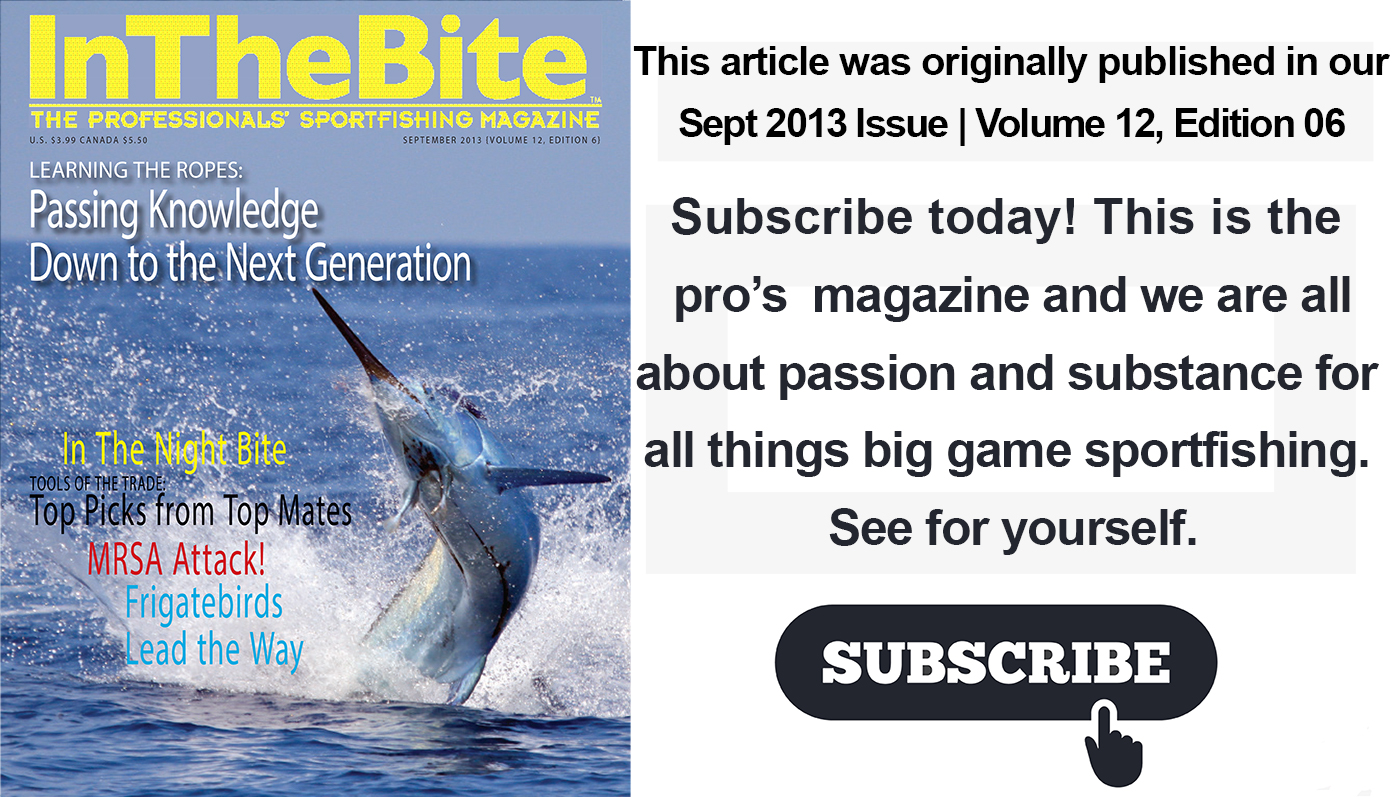 All three captains use a variety of lights to attract fish to their baits. Flush-mounted lights under the stern illuminate the water below the boat while a Hydro Glow light dangling in the water provides even more illumination. Smith uses both lights, but when the seas are choppy, he turns off the thru-hull lights. The boat rocking back and forth changes the angle of the light and makes them flash, he explains, Im still trying to determine if it affects the fish. Up in Rhode Island, when Sprengle is in full stealth mode on wary tuna hell turn off everything but the anchor light on his rig.
To call the fish to the hook, the skippers attach battery-operated waterproof lights in front of each bait. Smith likes the Electrolume lamps that change colors above his baits. Scientists tell us that purple and blue light travels the farthest underwater, he says, but greens and reds are most common in nature.
Smith also likes a Mardi Gras light that changes colors to imitate a pulsating squid. He adds smaller, water-activated strobes just ahead of the hook. Lighting the baits is only half the story, as each pro has a different approach to lighting the boat. On his 50-foot sportfish, Koci uses LED spreader lights to illuminate the cockpit. Bouncer Smith lights up his 30-foot Dusky with spreader lights bow, stern and aft. The spreader lights are mostly so other boats can see us, he explains, I point the lights at the water so they dont blind the other captains. He uses blue lights under the T-top for rigging. Blue lights dont ruin your night vision, he explains, and they look really cool too.
Hooking and fighting fish in the dark presents a special challenge, too. When the fish first hits, Smith doesnt rush to get the angler into the harness. A lot of time, the fish takes the bait and keeps swimming toward the light and the boat, he says, If the fish shoots under the boat, you may have to stick the rod tip into the water and point it at the fish. Fighting a big fish at night puts the angler and crew at a disadvantage. To make it easier to follow the line in the dark, Koci attaches a spreader light to an eight-foot pole and instructs one of the crew to hold it over the water and point it at the line. Sprengle has a different solution; he clips a glow stick to the line.
The glow stick floats and we can see where the line is going, he explains. In fact, Sprengle prefers to avoid all lights except his anchor light. I keep the lights off to spare my night vision, he says. Instead, I use a headlamp or flashlight to work by.
All three captains use a variety of lights to attract fish to their baits. Flush-mounted lights under the stern illuminate the water below the boat while a Hydro Glow light dangling in the water provides even more illumination. Smith uses both lights, but when the seas are choppy, he turns off the thru-hull lights. The boat rocking back and forth changes the angle of the light and makes them flash, he explains, Im still trying to determine if it affects the fish. Up in Rhode Island, when Sprengle is in full stealth mode on wary tuna hell turn off everything but the anchor light on his rig.
To call the fish to the hook, the skippers attach battery-operated waterproof lights in front of each bait. Smith likes the Electrolume lamps that change colors above his baits. Scientists tell us that purple and blue light travels the farthest underwater, he says, but greens and reds are most common in nature.
Smith also likes a Mardi Gras light that changes colors to imitate a pulsating squid. He adds smaller, water-activated strobes just ahead of the hook. Lighting the baits is only half the story, as each pro has a different approach to lighting the boat. On his 50-foot sportfish, Koci uses LED spreader lights to illuminate the cockpit. Bouncer Smith lights up his 30-foot Dusky with spreader lights bow, stern and aft. The spreader lights are mostly so other boats can see us, he explains, I point the lights at the water so they dont blind the other captains. He uses blue lights under the T-top for rigging. Blue lights dont ruin your night vision, he explains, and they look really cool too.
Hooking and fighting fish in the dark presents a special challenge, too. When the fish first hits, Smith doesnt rush to get the angler into the harness. A lot of time, the fish takes the bait and keeps swimming toward the light and the boat, he says, If the fish shoots under the boat, you may have to stick the rod tip into the water and point it at the fish. Fighting a big fish at night puts the angler and crew at a disadvantage. To make it easier to follow the line in the dark, Koci attaches a spreader light to an eight-foot pole and instructs one of the crew to hold it over the water and point it at the line. Sprengle has a different solution; he clips a glow stick to the line.
The glow stick floats and we can see where the line is going, he explains. In fact, Sprengle prefers to avoid all lights except his anchor light. I keep the lights off to spare my night vision, he says. Instead, I use a headlamp or flashlight to work by.

Photo courtesy Capt. Jack Sprengle
Sweet Dreams
Without planning and preparation, running a marathon all-nighter at sea can turn into a nightmare. After years of nights on the water, Koci, Smith and Sprengle have tips for a more pleasant experience. Everyone has to know his role, Koci says, I usually take two mates and extended trips require two captains. All three skippers stress rigging up before leaving the dock and having all baits and tackle ready before the sun goes down. Even for experienced deckhands, rigging at night increases the chance of making an error that could cost the team a trophy fish. Koci also makes sure his freshwater tank is topped off before leaving. Well use a couple dozen outfits in the course of a trip, he says, and it better to rinse off each one before putting it away. Rinsing and storing the rods at sea also saves on clean-up back at the dock, which is the last thing you want to do after an epic all-nighter, Koci laughs. All three captains stress the importance of dressing for foul weather. After sitting all night youll be wet and stiff and cold, Smith says, so warm clothes, rain gear and dry towels will save the day. Sprengle adds, There have been nights in the middle of summer when I was wearing my full Grundens and wished I had brought another layer. Bean bag chairs get the nod from Sprengle and Smith, but Sprengle warns, They are so comfortable you may lose half your crew in the middle of the night. Koci encourages crew members to sleep. I always put someone on watch and grab a couple hours of shuteye myself, he says. Otherwise, I end up tired and then Im off my game. Comfort food also makes a night at sea more enjoyable. Koci breaks out the grill and makes burgers and hotdogs for the crew. Then I put a movie on in the cabin and the anglers can relax while we get the gear ready and the baits set. On their center consoles, Smith and Sprengle dont have time or space for such luxuries, opting instead for hearty sandwiches and salads. Sprengle brings cold-cuts and loaves of bread along with plenty of fruits and vegetables to boost energy levels and morale. All three skippers emphasis the need to hydrate through the night. Water and Gatorade are worth their weight in gold, Sprengle says, but save the booze for the victory party. Koci packs watermelon and cantaloupe to provide a watery snack. Each skipper also warns about the dangers of seasickness after dark. When the sun goes down and the lights come on, the horizon is erased and motion sensitive anglers may turn green. Guys who have never been sick before will get seasick at night, Smith says. He urges anglers to wear an anti-nausea patch or take medication before heading out for the night. If that doesnt work, turn off the cockpit lights and let the patient eyes adjust to the dark and reclaim the horizon.
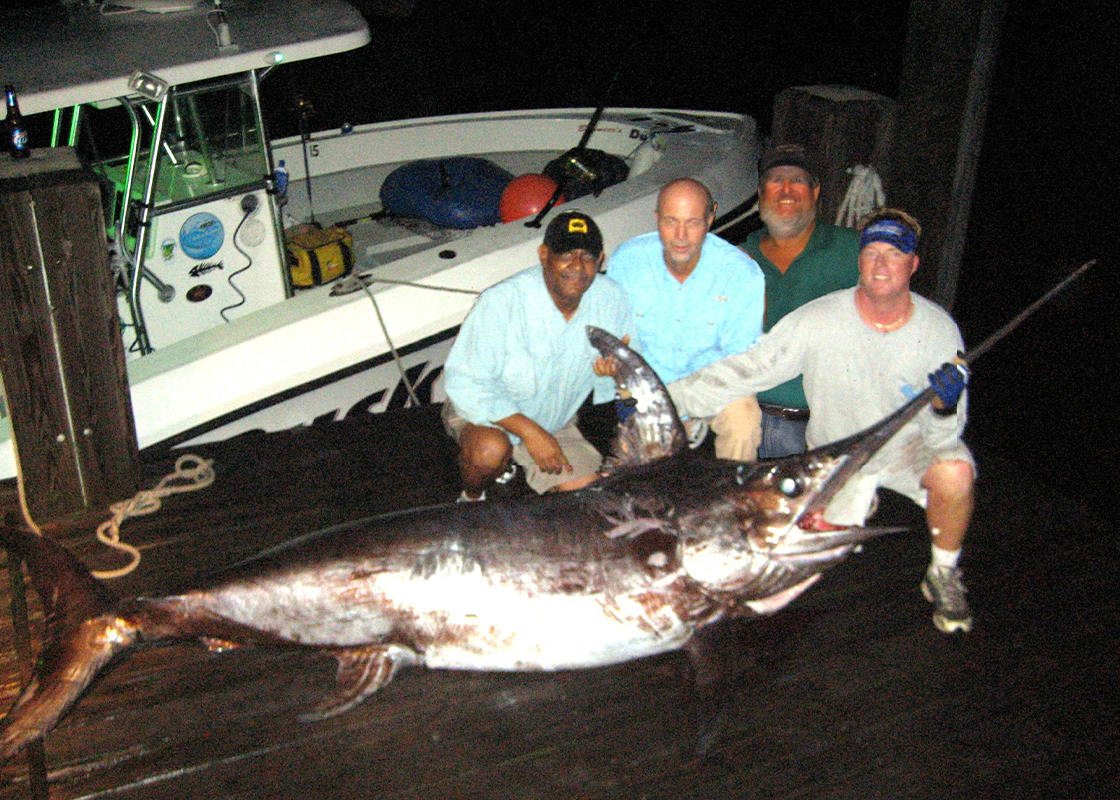
Photo courtesy Capt. Bouncer Smith
Play it Safe
All alone, bobbing in the middle of the ocean in a small boat in the pitch-black darkness, gremlins will fill a skipper imagination with all the things that could go wrong. To keep your mind at ease, make safety a primary concern. Carry extras of everything, Koci says, Food, water, lights, fuel filters, belts”anything that could go wrong and probably will. Koci and the other captains also leave a detailed float plan with their respective marinas and loved ones. If we break down while drifting in the Gulf Stream off Hatteras, we could be off New England before anyone realizes we are gone, Koci half-jokes. In spite of modern electronics, fishing in the dark can be very disorienting. Smith maintains a careful watch on wind and swell direction to maintain his bearings while Koci keeps his eye on the North Star to monitor his position. In the dark, it not enough to trust your electronics, he says, it comforting to have a back-up plan. Radar is also key to safely fishing at night. Set the alarm on one mile, Koci says, since boats and ships can sneak up on you in the dark. He also keeps one crew member on watch for passing vessels, drifting flotsam and other hazards that might not appear on his radar screen. All three captains also stress the importance of a high-quality VHF radio. Not only can other boats hear you from a greater distance, Sprengle says, but the Coast Guard and tow services can use your radio to triangulate your position. Serious anglers should also invest in a ship-to-shore radio and satphone, too. And have a good life raft for the crew, Sprengle adds, Dont even look at the price tag. Before leaving the dock, Bouncer Smith gives each crewmember a glow stick to carry in his pocket. If someone falls overboard, the glow stick makes it a lot easier to recover them, he explains. Many accidents can be avoided by slowing down and being careful. All three captains are sticklers for keeping the cockpit and rigging stations clean and clear. When the action starts, people will be running around and bumping into each other even more than usual, Koci says. He also stresses running the boat slowly to avoid collisions. I dont go more that 15 or 16 knots at night, Koci says, so I have a better chance to see something before I hit it. If I do have a collision it wont do as much damage to the boat. While night fishing may be more dangerous and less comfortable than fishing during the day, it can also be more productive and a hell of a lot more exciting. If youre not fishing at night, Koci says, youre missing the best part of the day.

